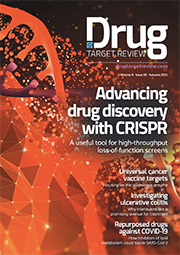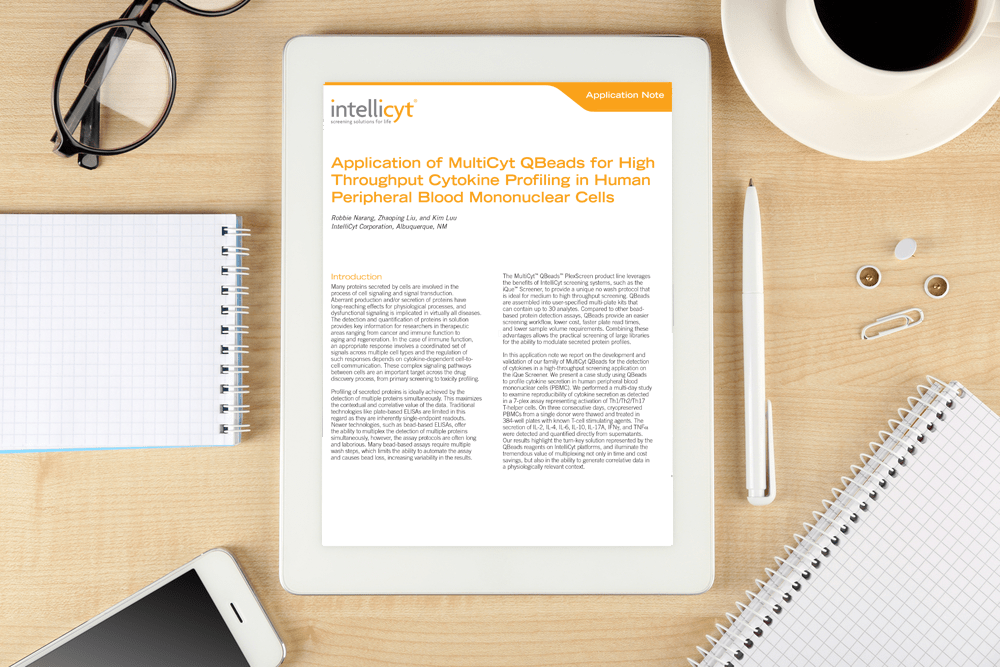Application note: Application of MultiCyt QBeads for high throughput cytokine profiling in human peripheral blood mononuclear cells
Posted: 18 September 2017 | Kim Luu (IntelliCyt Corporation), Robbie Narang (IntelliCyt Corporation), Zhaoping Liu (IntelliCyt Corporation) | No comments yet
In this application note IntelliCyt Corporation report on the development and validation of their family of MultiCyt QBeads for the detection of cytokines in a high-throughput screening application on the iQue Screener…
Many proteins secreted by cells are involved in the process of cell signaling and signal transduction. Aberrant production and/or secretion of proteins have long-reaching effects for physiological processes, and dysfunctional signaling is implicated in virtually all diseases. The detection and quantification of proteins in solution provides key information for researchers in therapeutic areas ranging from cancer and immune function to aging and regeneration. In the case of immune function, an appropriate response involves a coordinated set of signals across multiple cell types and the regulation of such responses depends on cytokine-dependent cell-tocell communication. These complex signaling pathways between cells are an important target across the drug discovery process, from primary screening to toxicity profiling.
Profiling of secreted proteins is ideally achieved by the detection of multiple proteins simultaneously. This maximizes the contextual and correlative value of the data. Traditional technologies like plate-based ELISAs are limited in this regard as they are inherently single-endpoint readouts. Newer technologies, such as bead-based ELISAs, offer the ability to multiplex the detection of multiple proteins simultaneously, however, the assay protocols are often long and laborious. Many bead-based assays require multiple wash steps, which limits the ability to automate the assay and causes bead loss, increasing variability in the results.
The MultiCyt™ QBeads™ PlexScreen product line leverages the benefits of IntelliCyt screening systems, such as the iQue™ Screener, to provide a unique no wash protocol that is ideal for medium to high throughput screening. QBeads are assembled into user-specified multi-plate kits that can contain up to 30 analytes. Compared to other beadbased protein detection assays, QBeads provide an easier screening workflow, lower cost, faster plate read times, and lower sample volume requirements. Combining these advantages allows the practical screening of large libraries for the ability to modulate secreted protein profiles.
In this application note we report on the development and validation of our family of MultiCyt QBeads for the detection of cytokines in a high-throughput screening application on the iQue Screener. We present a case study using QBeads to profile cytokine secretion in human peripheral blood mononuclear cells (PBMC). We performed a multi-day study to examine reproducibility of cytokine secretion as detected in a 7-plex assay representing activation of Th1/Th2/Th17 T-helper cells. On three consecutive days, cryopreserved PBMCs from a single donor were thawed and treated in 384-well plates with known T-cell stimulating agents. The secretion of IL-2, IL-4, IL-6, IL-10, IL-17A, IFNγ, and TNFα were detected and quantified directly from supernatants. Our results highlight the turn-key solution represented by the QBeads reagents on IntelliCyt platforms, and illuminate the tremendous value of multiplexing not only in time and cost savings, but also in the ability to generate correlative data in a physiologically relevant context.
This application note is restricted - login or subscribe free to access


Why subscribe? Join our growing community of thousands of industry professionals and gain access to:
- quarterly issues in print and/or digital format
- case studies, whitepapers, webinars and industry-leading content
- breaking news and features
- our extensive online archive of thousands of articles and years of past issues
- ...And it's all free!
Click here to Subscribe today Login here
Related content from this organisation
- Whitepaper: Addressing the challenges in biologics discovery with advanced flow cytometry
- Article: Immuno-oncology: Pushing the frontier of discovery through advanced high throughput flow cytometry
- Application note: A kinase inhibitor phenotypic screen using a multiplex T Cell activation assay
- Training and development in flow cytometry and other core technologies
- Expert view: Opportunities in flow cytometry
Related topics
Assays, Big Data, Cell-based assays, cytokines, Drug Discovery, Drug Discovery Processes, High Throughput Screening (HTS), Protein, Screening
Related organisations
IntelliCyt Corporation




